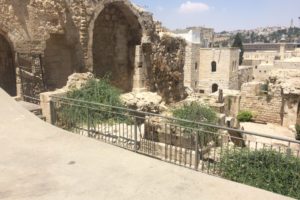Feasts of Trumpets, Yom Teruah, and Rosh HaShana are synonyms for the same feast and is the beginning of the Days of Awe. Rosh HaShana, which means “Head of the year” is Israel’s well celebrated New Year. Today begins the Jewish year 5780. Rabbinic tradition has taken the front stage, but this feast is rich in biblical significance.
The name, Rosh HaShana, emerged about the 2ndcentury C.E. and is thought to mark the creation of Adam and Eve. The bible does not call the first day of the seventh month by that name and briefly explains this Feast of Trumpets. A bit of a mystery, Yom Teruah has come to mean many things.
“Speak unto the children of Israel, saying, In the seventh month, in the first day of the month, shall ye have a sabbath, a memorial of blowing of trumpets, an holy convocation. Ye shall do no servile work therein: but ye shall offer an offering made by fire unto the LORD” (Lev. 23:23-24, KJV).
The day of “shouts” is a time of corporate praise, a holy convocation (gathering, assembly, rehearsal), in which offerings made by fire were given in addition to the daily sacrifices. The greatness of God—His name, His power, His awe, His ultimate authority over everything and everyone makes us aware of our need of him for what is ahead, and not just because of what God has already done.
In Christian culture, instead of giving this day little to no recognition, we should take special time to praise our God who has created everything that exists and who will have a glorious reward for the faithful and triumphant finish to evil; to remember the Kingship of the God of Abraham, Isaac, and Jacob who is also King of the Gentiles.
Numbers, chapter 10, teaches us about the various trumpet sounds that the sons of Aaron were to blow. The Israelites had a trumpet call that communicated special messages. They knew when to gather for instructions, assemble for feasts, come to worship, prepare for war, and even to coronate the King. The greatest remembrance is that God is King of not only Israel, but also the world!
The bible states that the Feasts of Trumpets is a day of rest, a Sabbath. Moreover, it is a High Holy Day with greater significance than the weekly Sabbath’s significance. We cease our labor as God did after creation, but more importantly, this day speaks to us that preparation is over and to anticipate that the King is about to take his place.
Many rabbinic traditions have been connected to this day. In Jerusalem, they give baskets of fruit and honey, blow the shofar 100 times during the special service as well as sing and pray in their synagogues. Apples and the special round, sweet challah bread shaped like a crown is dipped in honey for a symbol of a sweet year ahead. Bakeries bring out the most beautiful and delicious sweets of the year. The smell of the freshly baked flour and sugar tempts even the most dedicated dieters.
How should a Christian observe Feast of Trumpets? I am one who feels that all people who fear God should recognize His Feasts. I am a Gentile who believes in God’s set times. I see how Christ has fulfilled each feast day with the sacrifice of Himself. However, I also understand that the last three feasts have not had their literal fulfillment and are tied to Messiah’s coming:
“And he shall send his angels with a great sound of a trumpet, and they shall gather together his elect from the four winds, from one end of heaven to the other” (Matthew 24:31).
“In a moment, in the twinkling of an eye, at the last trump: for the trumpet shall sound, and the dead shall be raised incorruptible, and we shall be changed” (1 Corinthians 15:52).
“For the Lord himself shall descend from heaven with a shout, with the voice of the archangel, and with the trump of God: and the dead in Christ shall rise first: Then we which are alive and remain shall be caught up together with them in the clouds, to meet the Lord in the air: and so shall we ever be with the Lord” (1 Thessalonians 4:16-17).
Therefore, pure worship is a sweet aroma before the Lord. We lift our voice as a trumpet before Him. We take rest in His peace and await the final trumpet blast. Does that mean rapture (pre, mid, post)? We Christians argue this topic endlessly. God’s word is clear, but we are yet to understand clearly (1 Cor. 13:12) and heatedly disagree. For sure, God’s trumpet will alert us to a glorious gathering and of the coming King for the ultimate new beginning.





